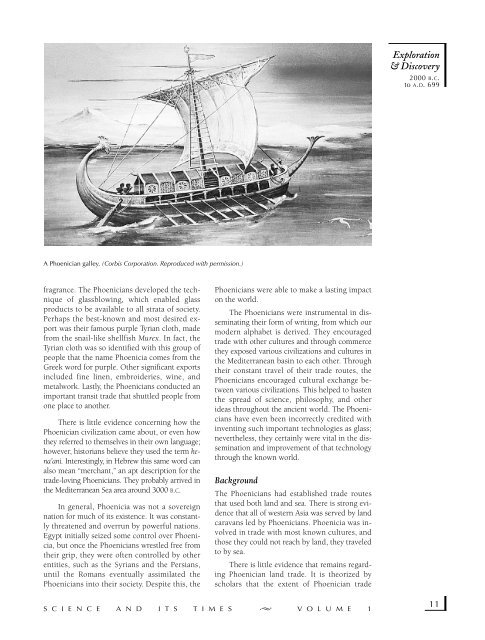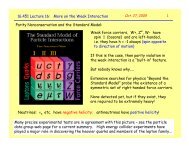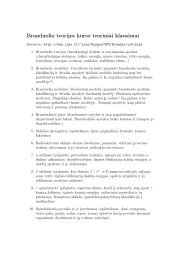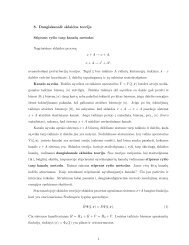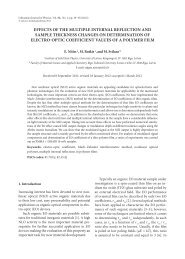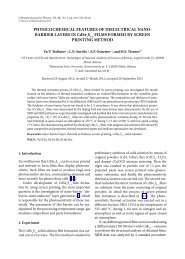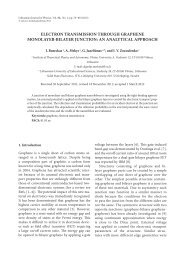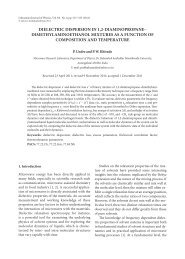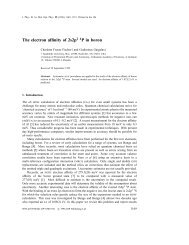- Page 1 and 2: VOLUME1 2000 B . C . to A . D . 699
- Page 3 and 4: Science and Its Times VOLUME1 2000
- Page 5 and 6: Contents 2000 B.C. to A.D. 699 Maya
- Page 7 and 8: Preface 2000 B.C. to A.D. 699 Arran
- Page 9 and 10: Contributors Amy Ackerberg-Hasting
- Page 11 and 12: Introduction: 2000 B.C. to A.D. 699
- Page 13 and 14: universe and the mathematical laws
- Page 15 and 16: Chronology 2000 B.C. to A.D. 699 na
- Page 17 and 18: Exploration & Discovery 2000 B.C. t
- Page 19 and 20: Exploration & Discovery 2000 B.C. t
- Page 21 and 22: Exploration & Discovery 2000 B.C. t
- Page 23 and 24: Exploration & Discovery 2000 B.C. t
- Page 25: Exploration & Discovery 2000 B.C. t
- Page 29 and 30: Exploration & Discovery 2000 B.C. t
- Page 31 and 32: Exploration & Discovery 2000 B.C. t
- Page 33 and 34: Exploration & Discovery 2000 B.C. t
- Page 35 and 36: Exploration & Discovery 2000 B.C. t
- Page 37 and 38: Exploration & Discovery 2000 B.C. t
- Page 39 and 40: Exploration & Discovery 2000 B.C. t
- Page 41 and 42: Exploration & Discovery 2000 B.C. t
- Page 43 and 44: Exploration & Discovery 2000 B.C. t
- Page 45 and 46: Exploration & Discovery 2000 B.C. t
- Page 47 and 48: Exploration & Discovery 2000 B.C. t
- Page 49 and 50: Exploration & Discovery 2000 B.C. t
- Page 51 and 52: Exploration & Discovery 2000 B.C. t
- Page 53 and 54: Exploration & Discovery 2000 B.C. t
- Page 55 and 56: Exploration & Discovery 2000 B.C. t
- Page 57 and 58: Exploration & Discovery 2000 B.C. t
- Page 59 and 60: Exploration & Discovery 2000 B.C. t
- Page 61 and 62: Exploration & Discovery 2000 B.C. t
- Page 63 and 64: Exploration & Discovery 2000 B.C. t
- Page 65 and 66: Exploration & Discovery 2000 B.C. t
- Page 67 and 68: Exploration & Discovery 2000 B.C. t
- Page 69 and 70: Exploration & Discovery 2000 B.C. t
- Page 71 and 72: Exploration & Discovery 2000 B.C. t
- Page 73 and 74: Exploration & Discovery 2000 B.C. t
- Page 75 and 76: Exploration & Discovery 2000 B.C. t
- Page 77 and 78:
Exploration & Discovery 2000 B.C. t
- Page 79 and 80:
Exploration & Discovery 2000 B.C. t
- Page 81 and 82:
Exploration & Discovery 2000 B.C. t
- Page 83 and 84:
Exploration & Discovery 2000 B.C. t
- Page 85 and 86:
Exploration & Discovery 2000 B.C. t
- Page 87 and 88:
Exploration & Discovery 2000 B.C. t
- Page 89 and 90:
Exploration & Discovery 2000 B.C. t
- Page 91 and 92:
Exploration & Discovery 2000 B.C. t
- Page 93 and 94:
Exploration & Discovery 2000 B.C. t
- Page 95 and 96:
Exploration & Discovery 2000 B.C. t
- Page 97 and 98:
Exploration & Discovery 2000 B.C. t
- Page 99 and 100:
Exploration & Discovery 2000 B.C. t
- Page 101 and 102:
Exploration & Discovery 2000 B.C. t
- Page 103 and 104:
Exploration & Discovery 2000 B.C. t
- Page 105 and 106:
Exploration & Discovery 2000 B.C. t
- Page 107 and 108:
Life Sciences & Medicine 2000 B.C.
- Page 109 and 110:
Life Sciences & Medicine 2000 B.C.
- Page 111 and 112:
Life Sciences & Medicine 2000 B.C.
- Page 113 and 114:
Life Sciences & Medicine 2000 B.C.
- Page 115 and 116:
Life Sciences & Medicine 2000 B.C.
- Page 117 and 118:
Life Sciences & Medicine 2000 B.C.
- Page 119 and 120:
Life Sciences & Medicine 2000 B.C.
- Page 121 and 122:
Life Sciences & Medicine 2000 B.C.
- Page 123 and 124:
Life Sciences & Medicine 2000 B.C.
- Page 125 and 126:
Life Sciences & Medicine 2000 B.C.
- Page 127 and 128:
Life Sciences & Medicine 2000 B.C.
- Page 129 and 130:
Life Sciences & Medicine 2000 B.C.
- Page 131 and 132:
Life Sciences & Medicine 2000 B.C.
- Page 133 and 134:
Life Sciences & Medicine 2000 B.C.
- Page 135 and 136:
Life Sciences & Medicine 2000 B.C.
- Page 137 and 138:
Life Sciences & Medicine 2000 B.C.
- Page 139 and 140:
Life Sciences & Medicine 2000 B.C.
- Page 141 and 142:
Life Sciences & Medicine 2000 B.C.
- Page 143 and 144:
Life Sciences & Medicine 2000 B.C.
- Page 145 and 146:
Life Sciences & Medicine 2000 B.C.
- Page 147 and 148:
Life Sciences & Medicine 2000 B.C.
- Page 149 and 150:
Life Sciences & Medicine 2000 B.C.
- Page 151 and 152:
Life Sciences & Medicine 2000 B.C.
- Page 153 and 154:
Life Sciences & Medicine 2000 B.C.
- Page 155 and 156:
Life Sciences & Medicine 2000 B.C.
- Page 157 and 158:
Life Sciences & Medicine 2000 B.C.
- Page 159 and 160:
Life Sciences & Medicine 2000 B.C.
- Page 161 and 162:
Life Sciences & Medicine 2000 B.C.
- Page 163 and 164:
Life Sciences & Medicine 2000 B.C.
- Page 165 and 166:
Life Sciences & Medicine 2000 B.C.
- Page 167 and 168:
Life Sciences & Medicine 2000 B.C.
- Page 169 and 170:
Mathematics Chronology c. 2000 B.
- Page 171 and 172:
Trisecting an angle seems like an e
- Page 173 and 174:
to make calculation easier by linki
- Page 175 and 176:
triangle, for example, could be con
- Page 177 and 178:
A.D. to the late sixth century A.D.
- Page 179 and 180:
some important mathematical concept
- Page 181 and 182:
Mathematics 2000 B.C. to A.D. 699 A
- Page 183 and 184:
exported some mathematics to the We
- Page 185 and 186:
Background Long before the inventio
- Page 187 and 188:
through the contacts between mercha
- Page 189 and 190:
B.C.) and Aristotle (384-322 B.C.),
- Page 191 and 192:
ducing some useful results, but no
- Page 193 and 194:
of modern arithmetic calculation, c
- Page 195 and 196:
The Historical Relationship of Logi
- Page 197 and 198:
3. A circle can be drawn with any c
- Page 199 and 200:
In modern times, the huge number of
- Page 201 and 202:
nique called the method of exhausti
- Page 203 and 204:
By the time Euclid (c. 330-c. 270 B
- Page 205 and 206:
Background In its modern and elemen
- Page 207 and 208:
Impact Our word “algebra” is de
- Page 209 and 210:
Hipparchus considered every triangl
- Page 211 and 212:
tended seagoing journeys and explor
- Page 213 and 214:
numbers for centuries. Around A.D.
- Page 215 and 216:
Overview The zero was invented thre
- Page 217 and 218:
Further Reading Kaplan, Robert. The
- Page 219 and 220:
y a confederation of city-states, a
- Page 221 and 222:
His misfortunes began in 522, when
- Page 223 and 224:
Propositions 10 through 12 offered
- Page 225 and 226:
In fact the historical existence of
- Page 227 and 228:
Most likely Geminus came from the G
- Page 229 and 230:
other problem of long standing amon
- Page 231 and 232:
had yet to gain formal definition.
- Page 233 and 234:
ing two of the famous problems that
- Page 235 and 236:
Pythagoras of Samos. (Corbis Corpor
- Page 237 and 238:
ics: because of the massive destruc
- Page 239 and 240:
Archimedes c. 287-212 B.C. Greek ma
- Page 241 and 242:
of duplicating the cube by a number
- Page 243 and 244:
argued that all existing things do
- Page 245 and 246:
Wang Hs’iao-t’ung fl. c. 625 Ch
- Page 247 and 248:
gational instruments. Eratosthenes
- Page 249 and 250:
Physical Sciences Chronology c. 6
- Page 251 and 252:
siderable attention: optics (or per
- Page 253 and 254:
Parmenides argued that reason is su
- Page 255 and 256:
lated problem is that of Continuity
- Page 257 and 258:
tant, most concern his ethical teac
- Page 259 and 260:
Barnes, Jonathan. The Presocratics.
- Page 261 and 262:
ules for calculating solar and luna
- Page 263 and 264:
Egyptian civilization dominated by
- Page 265 and 266:
world around them. This was particu
- Page 267 and 268:
Overview Keeping track of the passa
- Page 269 and 270:
Dreyer, J.L.E. A History of Astrono
- Page 271 and 272:
uler maintained his positive relati
- Page 273 and 274:
Overview During the second century
- Page 275 and 276:
defended heliocentrism in the secon
- Page 277 and 278:
posites to be the truest substances
- Page 279 and 280:
Due to its far greater sophisticati
- Page 281 and 282:
ens stretched on infinitely above t
- Page 283 and 284:
Overview Located in a seismically a
- Page 285 and 286:
Impact Opinions vary as to whether
- Page 287 and 288:
In Physics, Aristotle made a distin
- Page 289 and 290:
Physical Sciences 2000 B.C. to A.D.
- Page 291 and 292:
share the same dimensions of base a
- Page 293 and 294:
attempting to extract general laws
- Page 295 and 296:
variation in the apparent diameters
- Page 297 and 298:
Physical Sciences 2000 B.C. to A.D.
- Page 299 and 300:
Epicurus. (Bettmann/Corbis. Reprodu
- Page 301 and 302:
Saint Isidore of Seville 560-636 Sp
- Page 303 and 304:
He was a native of Madaura, Numidia
- Page 305 and 306:
has long puzzled scholars, some of
- Page 307 and 308:
much easier rolling surface than ca
- Page 309 and 310:
complexity, in part, derived from h
- Page 311 and 312:
god would more likely resemble the
- Page 313 and 314:
trivium and quadrivium) that were t
- Page 315 and 316:
Marcus Manilius 48? B.C.-A.D. 20 Ro
- Page 317 and 318:
Shih Shen fl. c. 350 B.C. Chinese a
- Page 319 and 320:
Menelaus of Alexandria. Sphaerica (
- Page 321 and 322:
Technology & Invention 2000 B.C. to
- Page 323 and 324:
Technology & Invention 2000 B.C. to
- Page 325 and 326:
Technology & Invention 2000 B.C. to
- Page 327 and 328:
Technology & Invention 2000 B.C. to
- Page 329 and 330:
Technology & Invention 2000 B.C. to
- Page 331 and 332:
Technology & Invention 2000 B.C. to
- Page 333 and 334:
Technology & Invention 2000 B.C. to
- Page 335 and 336:
Technology & Invention 2000 B.C. to
- Page 337 and 338:
Technology & Invention 2000 B.C. to
- Page 339 and 340:
Technology & Invention 2000 B.C. to
- Page 341 and 342:
Technology & Invention 2000 B.C. to
- Page 343 and 344:
Technology & Invention 2000 B.C. to
- Page 345 and 346:
Technology & Invention 2000 B.C. to
- Page 347 and 348:
Technology & Invention 2000 B.C. to
- Page 349 and 350:
Technology & Invention 2000 B.C. to
- Page 351 and 352:
Technology & Invention 2000 B.C. to
- Page 353 and 354:
Technology & Invention 2000 B.C. to
- Page 355 and 356:
Technology & Invention 2000 B.C. to
- Page 357 and 358:
Technology & Invention 2000 B.C. to
- Page 359 and 360:
Technology & Invention 2000 B.C. to
- Page 361 and 362:
Technology & Invention 2000 B.C. to
- Page 363 and 364:
Technology & Invention 2000 B.C. to
- Page 365 and 366:
Technology & Invention 2000 B.C. to
- Page 367 and 368:
Technology & Invention 2000 B.C. to
- Page 369 and 370:
Technology & Invention 2000 B.C. to
- Page 371 and 372:
Technology & Invention 2000 B.C. to
- Page 373 and 374:
Technology & Invention 2000 B.C. to
- Page 375 and 376:
Technology & Invention 2000 B.C. to
- Page 377 and 378:
Technology & Invention 2000 B.C. to
- Page 379 and 380:
Technology & Invention 2000 B.C. to
- Page 381 and 382:
Technology & Invention 2000 B.C. to
- Page 383 and 384:
Technology & Invention 2000 B.C. to
- Page 385 and 386:
Technology & Invention 2000 B.C. to
- Page 387 and 388:
Technology & Invention 2000 B.C. to
- Page 389 and 390:
Technology & Invention 2000 B.C. to
- Page 391 and 392:
Technology & Invention 2000 B.C. to
- Page 393 and 394:
Technology & Invention 2000 B.C. to
- Page 395 and 396:
Technology & Invention 2000 B.C. to
- Page 397 and 398:
Technology & Invention 2000 B.C. to
- Page 399 and 400:
Technology & Invention 2000 B.C. to
- Page 401 and 402:
Technology & Invention 2000 B.C. to
- Page 403 and 404:
Technology & Invention 2000 B.C. to
- Page 405 and 406:
Technology & Invention 2000 B.C. to
- Page 407 and 408:
Technology & Invention 2000 B.C. to
- Page 409 and 410:
Technology & Invention 2000 B.C. to
- Page 411 and 412:
Technology & Invention 2000 B.C. to
- Page 413 and 414:
Technology & Invention 2000 B.C. to
- Page 415 and 416:
Technology & Invention 2000 B.C. to
- Page 417 and 418:
Technology & Invention 2000 B.C. to
- Page 419 and 420:
Technology & Invention 2000 B.C. to
- Page 421 and 422:
Technology & Invention 2000 B.C. to
- Page 423 and 424:
Technology & Invention 2000 B.C. to
- Page 425 and 426:
Technology & Invention 2000 B.C. to
- Page 427 and 428:
Technology & Invention 2000 B.C. to
- Page 429:
General Bibliography 2000 B.C. to A


